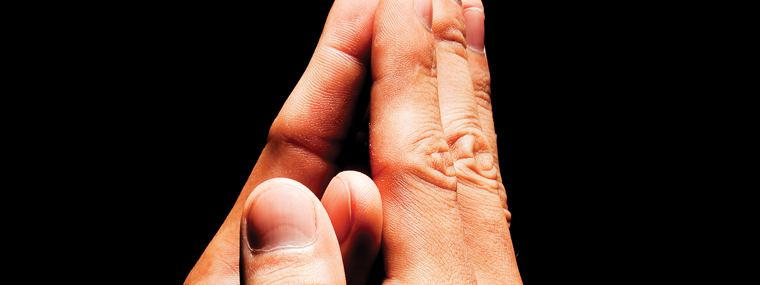
Reasons for Giving Thanks
By Diane M. Calabrese / Published November 2018

Sunday morning, butterflies, books, loved ones, raindrops, dawn…Whenever we stop to think about all the good in our lives, we give thanks in an informal way.
The Thanksgiving holiday encourages reflection on and thanks for the many wonderful dimensions of our lives. But a pause to reflect at any time brings real benefits.
There are many good reasons for giving thanks. A moment of reflection can help us through a difficult situation; there is almost always some good to be found even in the most anguish-making adversity. Giving thanks can bolster our health; when we pause to think, we take a deep breath and relax a bit. And stopping to give thanks can defuse a situation that might otherwise escalate needlessly; this one is a bit complex, so consider an example.
Suppose someone sends a harsh email or note or offers stinging criticism in person. The individual might be 99.9 percent wrong about the precipitating event, but responding in kind will only make it likely the exchange will become more negative. Being able to say something like “thanks for the feedback” or “thank you for letting me know your concerns” allows everyone to stop and take a step back from igniting the situation. And when reconsidered over time, a useful lesson may emerge.
As Emily Dickinson explained poetically in “Lost Joy,” a “daily bliss” has a way of growing when we take the time to perceive it. In addition, focus on the good fortifies us.
“Simply put, I’m thankful for every day that I’m blessed with and the opportunity to try to do better today than I did yesterday,” says Angela L. Hamilton, president of Dirt Killer Pressure Washers in Woodlawn, MD. “I’m so grateful for both my family at home and at work.
“Each year I set both personal and business goals, and my families are incredibly supportive in accomplishing those goals,” continues Hamilton. “The team here at our company is the best we’ve ever had. As a team, we’re thankful for all of our customers and the opportunity to continue to serve and support their businesses and their families.”
The concept of “opportunity” has great resonance. One of the most valuable early life lessons is that it’s not about falling down; instead, it’s about picking oneself back up. That opportunity to get back up is something for which to give thanks.
Perception of the positive elements of life includes the recognition of loved ones. “I am a very blessed man,” says Terry Murray, vice president of sales at Etowah Chemical Sales and Service in Gadsden, AL.
“I have been blessed to have been raised by a modest, hard-working, Christian family,” explains Murray. “I had six siblings, and we are all very close. I lost my twin brother in 1992. I am married to my soul mate, who has been my rock, and I have sons and grandchildren of whom I am very proud.”
Murray adds he has much to appreciate in his professional life, too. He is thankful for his business partner and for being part of a successful business in a great industry, as well as for work that he enjoys every day.
In every direction, there are blessings. One only needs to take the time to think about them.
“I am blessed by friends who are as close to me as family,” says Murray. “I am blessed to live in a great country and serve a great God.”
Calming Effect
Thanksgiving Day is deeply rooted in the history of the nation. It has been almost 500 years since the first gathering. Although some contemporary observances put an emphasis on recreation, tradition still holds widely as family and friends meet to offer thanks and share a meal.
A time to pause and reflect, Thanksgiving Day reminds us we can give thanks anywhere and on any day. Doing so has a calming effect. The restorative nature of giving thanks allows us to carry on and keep doing.
“I try to live by the philosophy of living with an attitude of gratitude, and though we may have difficulties or tragedies befall us, we can still find reasons to be grateful,” says Brenda Purswell, president of Alklean Industries Inc. in Pasadena, TX. (John Purswell, vice president of the company, also comments below.)
“We cannot change what happens to us, but we can control how we handle it,” explains Brenda Purswell. “Our attitudes can make or break a company, a church, a home, or a relationship. Life is 10 percent what happens to us and 90 percent how we react or handle it. I am grateful every day for my husband, my son I had for 41 years, family, friends, church, our company, and our employees.”
In whichever direction one looks, there is a choice: See the good or ignore the good. Consider the beautiful flowers of white Queen Anne’s lace (wild carrot) or blue chicory that manage to grow in an abandoned lot strewn with debris. Is there a happier message of the possibility of renewal that is ever present?
“It is the glass half-empty or half-full cliché,” says John Purswell. “We are so blessed in this country that we forget that although our government is corrupt, the regulations burdensome, taxes oppressive, and our rights chipped away one by one, the United States of America is only better than any other place and government in the history of the world. I try to reflect on that when voting or writing a tax check.”
John Purswell reminds us that being thankful should be coupled with doing our part to maintain all that is good. Contemplation is just one part of life.
“We are blessed to be born in the greatest country in the history of the world,” says Purswell. “It was not easy to get it and it will be harder to keep it, but it is worth the effort. God bless America.”
Are there ever times when an event is so difficult that is just not possible to find a reason to give thanks—at least not in the minute or hour or so close to the event? Yes, for most of us there are.
We all have pages to which we turn for solace. For some of us, it’s the books of Psalms or Proverbs in God’s Holy Bible.
Moreover, innumerable poems encourage us to buck up. First published more than 100 years ago, “If” by Rudyard Kipling is a message of guidance that many of us learned in school. Two bits of advice (paraphrased) in the Kipling poem: Keep your head when others are losing theirs, and put some distance between any incipient conflict and yourself.
Gratitude and Thanksgiving Day
Sharing a Latin root word with “know” and later an Old English word with “think,” ‘thank’ seems too much forgotten of late. Thanksgiving Day has even been renamed in some parts of the United States.
History is on the side of a designated day of Thanksgiving. Long before the first U.S. Thanksgiving in the early winter of 1621, other communities across millennia had taken time to give thanks.
Many days—and series of days—that were set aside for giving thanks were tied to harvests, such as the Feast of Demeter (Greek) and Cerelia (Roman).
When Governor Bradford set December 13, 1621, as a day of thanksgiving for the Plymouth settlers, a group that had seen almost half its number die in the first year in America, it was to give thanks for what appeared to be a sustaining harvest and an influx of game to the area. Native Americans, with Massasoit leading other Wampa-noag tribe members, joined the Plymouth settlers.
Our national Thanksgiving holiday, the fourth Thursday in November, is definitely the legacy of the 1621 gathering. But there were years with no observance, separate celebrations in separate states, and a bit of variation in the date. In 1860, President Lincoln established the last Thursday in November as a national Thanksgiving holiday. In 1939, President Franklin D. Roosevelt moved the holiday to the fourth Thursday in November. On December 26, 1941, Congress passed a law that the holiday would be the fourth Thursday in November.
Need it be written that actions by Lincoln and Roosevelt—and others along the way—in moving the day of Thanksgiving precipitated disagreement, different days of cele-bration, and even two days of celebration in some states? Now, there’s a reason to smile—humans are always going to disagree about something. And give thanks that no one came to fisticuffs and it all got worked out, demonstrating things can be worked out, particularly when time is the emollient.
Gratitude, argues Lillian Eichler in her book, The Customs of Mankind (1924), is what motivated the 1621 gathering that became the first Thanksgiving. Well before recent initiatives to rename and refocus the day, there were disagreements about why the day originated. Again, she argues that it was gratitude, pure and simple.
Giving thanks—pausing to reflect and be appreciative—has a way of blunting the intrusion of controversies. There’s so much for which to
be grateful. Happy Thanksgiving!





